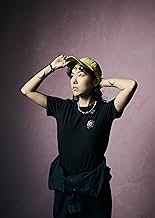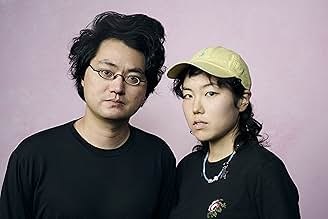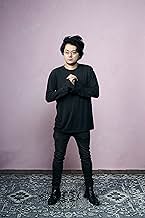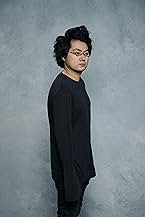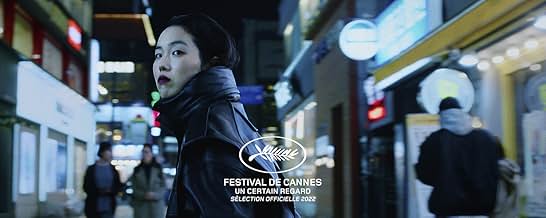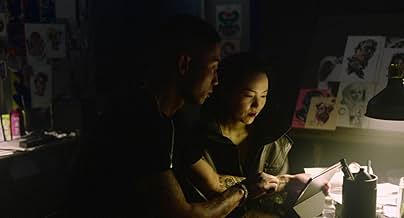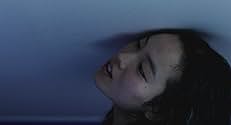CALIFICACIÓN DE IMDb
6.9/10
10 k
TU CALIFICACIÓN
Una Francesa de veinticinco años regresa por primera vez a Corea, el país en el que nació antes de ser adoptada por una pareja Francesa. Decide buscar a sus padres biológicos, pero su viaje ... Leer todoUna Francesa de veinticinco años regresa por primera vez a Corea, el país en el que nació antes de ser adoptada por una pareja Francesa. Decide buscar a sus padres biológicos, pero su viaje da un giro sorprendente.Una Francesa de veinticinco años regresa por primera vez a Corea, el país en el que nació antes de ser adoptada por una pareja Francesa. Decide buscar a sus padres biológicos, pero su viaje da un giro sorprendente.
- Dirección
- Guionistas
- Elenco
- Premios
- 10 premios ganados y 25 nominaciones en total
Heo Jin
- Grandmother
- (as Jin Heo)
Régine Vial
- Gisèle Benoît
- (as Régine Vial Goldberg)
Shin Dong-ho
- Tena's Father
- (as Dong-ho Shin)
Opiniones destacadas
The film offers a fresh and nuanced perspective on the complexities of identity, home, and emotional upheaval. The central character's multi-year quest to return to her place of birth serves as an intense focal point for exploring the intricate emotions and challenges related to adoption and self-discovery. However, a minor drawback lies in the occasional reliance on clichés, which briefly detract from the otherwise innovative approach.
The narrative structure stands out for its inventiveness, seamlessly weaving multiple timelines in a way that enriches the emotional landscape. The fragmented narrative is both audacious and purposeful, reflecting the protagonist's evolving inner world.
Beyond visual appeal, the film's cinematography serves as a narrative tool, adding layers of meaning to characters and themes. The score acts as the emotional backbone, elevating key moments and offering another layer to the viewer's experience.
In summary, the film emerges as a deeply affecting and intellectually stimulating exploration of identity, adoption, and the pursuit of true belonging. With its compelling storytelling, captivating performances, and visually arresting cinematography, it provides not just entertainment but a profound cinematic experience.
The narrative structure stands out for its inventiveness, seamlessly weaving multiple timelines in a way that enriches the emotional landscape. The fragmented narrative is both audacious and purposeful, reflecting the protagonist's evolving inner world.
Beyond visual appeal, the film's cinematography serves as a narrative tool, adding layers of meaning to characters and themes. The score acts as the emotional backbone, elevating key moments and offering another layer to the viewer's experience.
In summary, the film emerges as a deeply affecting and intellectually stimulating exploration of identity, adoption, and the pursuit of true belonging. With its compelling storytelling, captivating performances, and visually arresting cinematography, it provides not just entertainment but a profound cinematic experience.
I could not watch this film without any expectation or prejudice, as I know someone who has a sibling that is an adopted Korean child. However I still tried to keep an open mind, and I think the film is executed well.
Freddie is the only character that is really fleshed out and I think that's right. There are several other characters, notably Freddie's father, that are treated with respect by the film but they are not given a lot of depth. But since it's not their story that is being told they all have to take a back seat to the little girl that it's all about.
After watching this I did a little digging and I found that adoption, foreign or not, is culturally, politically and therefore historically laden in South Korea. You have to want to go looking for it as the film does not push the subject too heavily, but it certainly has several scenes referring to this subject from the institutional rather than the personal viewpoint.
I do think the film has some problems in finding the right tone and there are segments that do not help progress the story. The whole birthday party segment might be nicely shot but does not really add anything.
All in all it's a good film and it triggered me to learning a bit more about its subject matter.
Freddie is the only character that is really fleshed out and I think that's right. There are several other characters, notably Freddie's father, that are treated with respect by the film but they are not given a lot of depth. But since it's not their story that is being told they all have to take a back seat to the little girl that it's all about.
After watching this I did a little digging and I found that adoption, foreign or not, is culturally, politically and therefore historically laden in South Korea. You have to want to go looking for it as the film does not push the subject too heavily, but it certainly has several scenes referring to this subject from the institutional rather than the personal viewpoint.
I do think the film has some problems in finding the right tone and there are segments that do not help progress the story. The whole birthday party segment might be nicely shot but does not really add anything.
All in all it's a good film and it triggered me to learning a bit more about its subject matter.
As an audience member, films that cover the topic of adoption, there are expected themes of identity involved. But instead we get more of a random style of set-pieces within the conventional moments that represented identity in a unique way.
For the most part, it worked for the character and the story. But there were some that I just couldn't get on board with and some were even so random they were unforgivable.
I really liked Park Ji-Min's performance. I enjoyed the attitude that she gave to the leading character and the spontaneous moments that she orchestrated were largely memorable and one of the strongest parts of the film.
I liked the overall look. It was able to give us some effective imagery in different environments and never feel like different films.
The pacing was gentle. There were some purposeful lingering shots which worked well for the most part. Also, the camerawork was respectful with its wide shots as it let the pictures do the talking instead of taking over and turning it into something that wasn't intended.
As mentioned, I wasn't invested with every decision made. Some of the choices in the narrative in the second half made no sense to me. There were others I appreciated, but just wasn't a fan of them.
Despite that, I thought this was still a good enough drama that was worth my time. It's got a solid leading performance that you're willing to invest in. It also poses some interesting representations on the themes of identity that I've not seen before.
I cannot forgive some of the random moments in the second half. But nevertheless, there was enough engrossing moments to keep me guessing how this would end.
For the most part, it worked for the character and the story. But there were some that I just couldn't get on board with and some were even so random they were unforgivable.
I really liked Park Ji-Min's performance. I enjoyed the attitude that she gave to the leading character and the spontaneous moments that she orchestrated were largely memorable and one of the strongest parts of the film.
I liked the overall look. It was able to give us some effective imagery in different environments and never feel like different films.
The pacing was gentle. There were some purposeful lingering shots which worked well for the most part. Also, the camerawork was respectful with its wide shots as it let the pictures do the talking instead of taking over and turning it into something that wasn't intended.
As mentioned, I wasn't invested with every decision made. Some of the choices in the narrative in the second half made no sense to me. There were others I appreciated, but just wasn't a fan of them.
Despite that, I thought this was still a good enough drama that was worth my time. It's got a solid leading performance that you're willing to invest in. It also poses some interesting representations on the themes of identity that I've not seen before.
I cannot forgive some of the random moments in the second half. But nevertheless, there was enough engrossing moments to keep me guessing how this would end.
Inspired by the life of Laure Badufle, the screen-writer, "Return To Seoul" takes us on a journey of regret, anger, sorrow and wondering what could have been. This film puts an exciting spin on the "adoptee wants to find their biological parents" genre with its depiction of all of the stages Freddie, the protagonist, goes through on her journey of reconciling with her biological parents and also finding her own identity. Davy Chou, the director, captures incredibly Freddie's stance on reuniting with her father, which shows that she is torn between wanting to meet him and being angry with him for giving her up in the first place - this ambivalence keeps the whole narrative thrilling in an otherwise slow pace/slow burn picture like this. What I must appreciate is the truly realistic approach to the legislative side of how adoptees can find their parents, that helps the film being believable. Also I completely admired the striking performance of Park Ji-min in the titular role and I couldn't believe that this was actually her first film ever.
What stands out the most about this film is its refusal to take the easy route. While viewers may think they can predict the direction after the first act, they are mistaken. The narrative defies predictability, mirroring the unpredictable nature of wounded souls and those who never feel truly at home.
The protagonist's actions may seem foolish, but what truly captivates is the striking humanity portrayed with raw realism, making it impossible to abandon the desire and hope for her to find solace within. I was left speechless when I found out that this is Ji-Min Park's debut role. A role that made me shed tears on more than one occasion and that is her merit in making us see so well that everything she is, is the result of her life's circumstances.
The experiende Oh Gwan-rok, in the role of the biological father, is also outstanding, but this is not just a film of performances. It boasts brilliant scenes, expertly paced storytelling, daring technical choices, and a secure, risk-taking direction, all complemented by a flawless soundtrack.
PS: The main theme of this and the one of "Decision to Leave" are two haunting melodies that linger in my mind, compelling me to delve deeper into the history of South Korean music.
The protagonist's actions may seem foolish, but what truly captivates is the striking humanity portrayed with raw realism, making it impossible to abandon the desire and hope for her to find solace within. I was left speechless when I found out that this is Ji-Min Park's debut role. A role that made me shed tears on more than one occasion and that is her merit in making us see so well that everything she is, is the result of her life's circumstances.
The experiende Oh Gwan-rok, in the role of the biological father, is also outstanding, but this is not just a film of performances. It boasts brilliant scenes, expertly paced storytelling, daring technical choices, and a secure, risk-taking direction, all complemented by a flawless soundtrack.
PS: The main theme of this and the one of "Decision to Leave" are two haunting melodies that linger in my mind, compelling me to delve deeper into the history of South Korean music.
¿Sabías que…?
- TriviaThe movie is based on the life of Laure Badufle, a friend of director Davy Chou. Like Freddie, she was born in South Korea, stayed a year there before being adopted in France. At age 23, she came back and lived for two years there before returning to France. A few years after that, Chou accompanied her to South Korea, when they met her biological father and grandmother. According to him, the meeting was full of emotions, of regret and bad communication, with the translator struggling to convey Badufle's anger into polite Korean.
- Bandas sonorasPetals
Written by Shin Jung-Hyun
Performed by Lee Junh-Hwa
Selecciones populares
Inicia sesión para calificar y agrega a la lista de videos para obtener recomendaciones personalizadas
- How long is Return to Seoul?Con tecnología de Alexa
Detalles
- Fecha de lanzamiento
- Países de origen
- Sitio oficial
- Idiomas
- También se conoce como
- Return to Seoul
- Locaciones de filmación
- Productoras
- Ver más créditos de la compañía en IMDbPro
Taquilla
- Presupuesto
- EUR 2,200,000 (estimado)
- Total en EE. UU. y Canadá
- USD 798,774
- Fin de semana de estreno en EE. UU. y Canadá
- USD 27,315
- 19 feb 2023
- Total a nivel mundial
- USD 2,175,376
- Tiempo de ejecución1 hora 59 minutos
- Color
- Relación de aspecto
- 1.85 : 1
Contribuir a esta página
Sugiere una edición o agrega el contenido que falta

Principales brechas de datos
What is the Canadian French language plot outline for Regreso a Seúl (2022)?
Responda



